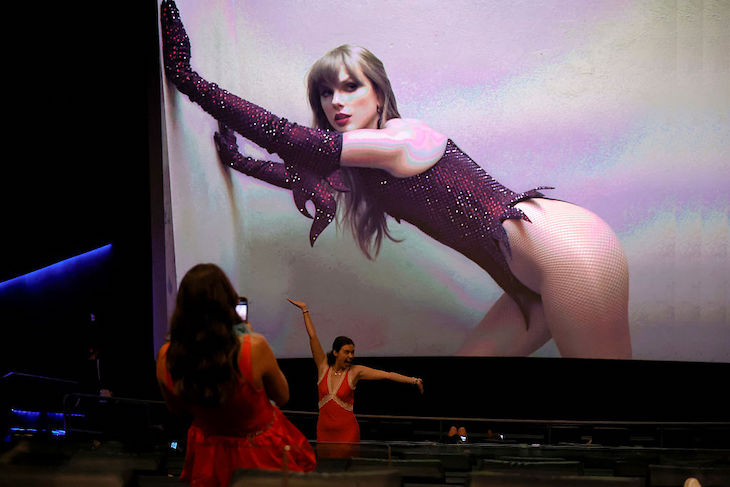Taylor Swift’s new album, The Life of a Showgirl, has done more than dominate the charts. It’s reignited one of the oldest – and fiercest – battles in modern womanhood. Once again, the pop icon has found herself cast as both heroine and heretic in the (pop) culture war’s endless inquest into what women should want.
In The Tortured Poets Department, the mask began to slip as Swift tore into her non-committal ‘forever-boyfriend’
But this time, the controversy isn’t over her style or sound. It’s over something far more dangerous in 2025: her desire for love, marriage, and children.
Swift’s confession in track five, ‘Eldest Daughter’ – ‘When I said I didn’t believe in marriage, that was a lie’ – has startled her audience. In a single lyric, she seems to repent of her earlier disdain for the so-called ‘1950s sh!t’ of domesticity (Lavender Haze, 2022). Suddenly, the woman who once made a religion of independence is daydreaming about devotion, permanence, and family.
Many conservatives have welcomed this as a long-awaited turn toward sanity. After all, wasn’t Swift’s teenage work ‘Love Story’ the anthem of an age that still believed in Prince Charming and happy ever after?
Yet others bristle. Swift’s album’s promotional materials feature sexualised photos of the star wrapped in sequins, and little else. Some of the less thought-provoking songs she’s written are steeped in eyebrow-raising innuendo. How could Swift possibly stand for ‘traditional values’? Is she really one of them – or simply another celebrity indulging a sentimental phase?
Meanwhile, left-wing Swifties are in chaos. Some progressives have accused Swift of going ‘full MAGA’ for saying she wants to marry her boyfriend, Travis Kelce, and have ‘babies that look like him’ (Wi$h Li$t). Calmer voices – and thankfully, there are some – have pointed out how absurd this has become. Since when did desiring marriage and motherhood qualify as a political statement? Isn’t that just…normal?
This is where Swift’s latest reinvention tells us something profound. She hasn’t joined a political camp. She has simply stumbled upon an ancient truth: one buried beneath decades of feminist sloganeering: that hedonism alone cannot fill the human heart.
For years, Swift embodied the millennial ideal of success: autonomous, ambitious, and emotionally unanchored. She sang of triumphs, trophies, and the thrill of dancing alone. But in The Tortured Poets Department (2024), the mask began to slip as she tore into her non-committal ‘forever-boyfriend’ who had taken the years of her youth without the promise of a marriage: ‘You swore that you loved me, but where were the clues? I died on the altar waiting for the proof,’ she confessed. It was a bitter lament for love without commitment, years spent waiting for ‘imaginary rings’ that never came. These weren’t the lyrics of liberation. They were the cry of a woman realising that ‘having it all’ on the world’s stage is no replacement for family and permanence.
Sociologists call it ‘the Paradox of Happiness’. According to a Yale study, many women, despite unprecedented power, wealth and education, are unhappier than their grandmothers. Swift has turned that statistic into song. Her longing for marriage and family is a revelation common to millennials everywhere.
That’s what makes her so dangerous to the secular orthodoxy. Because she hasn’t been catechised by conservatives or claimed by Christians. Her testimony comes not from ideology, but from experience: from the ache of discovering that independence without intimacy feels like exile.
So when Swift sings of settling down, she isn’t turning right-wing. She’s turning home. She’s rediscovering what women across centuries have known instinctively: that love, marriage, and motherhood are not cages, but fulfilling callings. Swift has managed, through her music, to expose the fragile lie beneath modern feminism: that self-sufficiency is the summit of female fulfilment.
In a culture that tells women to chase everything except contentment, Taylor Swift’s quiet confession is almost revolutionary. Her voice may not belong to the Church – but it carries a truth the Church has always known.
And if a pop idol can remind a generation that marriage and family are not shameful, but sacred, then perhaps the war of women is not lost after all.







Comments